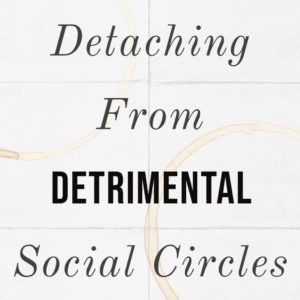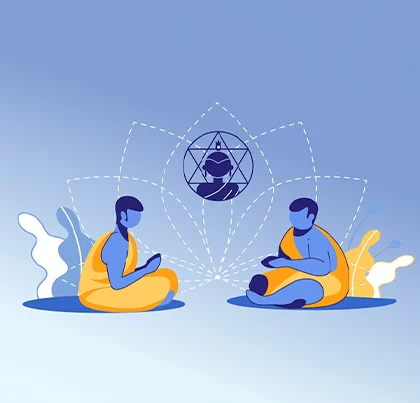Detaching From Detrimental Social Circles

Recovery from addiction to drugs, alcohol, or any other kind of addictive substance or behavior, requires each person to look at almost every aspect of their lives, from their professional workplace, environmental stressors, daily routines, coping strategies, and even their own social circles. While each person may be making a number of changes in their lives through their own journey to sobriety, addressing a person’s social circles can be a very difficult task. The friends that a person has made can have a huge influence over their recovery and relationship with drugs or alcohol, and it is possible that the social circles that a person is a part of can either greatly help them through the recovery process or prove to be a detriment to the sobriety that each person in recovery is striving to maintain.
Stepping Back and Looking Objectively
Being able to step back from one’s social circles and objectively evaluate the effects that they have on one’s continued recovery is a very difficult task. Recovery can mean detaching from any number of previous habits or routines in order to identify the role they play in one’s life. If a person regularly hangs out on the weekends with a particular group of friends, it may be important to take a week or two off from this practice in order to effectively determine the impact that these gatherings have on a person’s recovery. Realizing that a certain social group may not be conducive to the recovery process can be a difficult emotion to process. However, each person’s own continued sobriety is paramount through the recovery process and it may be necessary to address the situation with this circle of friends in order to create an environment that is supportive of recovery or finds other social outlets that are more supportive of continued sobriety.
Groups Can Hold Expectations
Social groups all come with their own culture. Inside jokes, unwritten rules, conversational tones, and much more all work in tandem to create a dynamic that is unique to any given social group. However, as a person begins their recovery journey, some of these social aspects may not prove to be in the best interest of continued sobriety. Having a beer while playing video games, attending a bar after work with professional colleagues, or even celebrating holidays and birthdays with drugs may all be socially accepted within a group but can be a major detriment to one’s newfound sobriety.
While it is possible for social groups to make the necessary adjustments in order to support ongoing recovery, it can be a very difficult process. Language may need to be changed in order to avoid introducing old urges and certain rituals or routines may have to be omitted in order to create a safe, sober environment. Because past routines can often hold a close connection to the use of an addictive substance, making these changes is necessary. Even if a group of friends decides not to drink while playing video games, if the behavior is too closely related to the previous use of drugs or alcohol, it can still cause urges to reengage with these past addictive substances. It may be necessary to find new activities to share with these groups of friends and try out new hobbies together to create the best possible scenario for continued sobriety.
Detaching From a Dangerous Social Circle
It is possible that some social groups may not want to make the necessary changes to create a safe and sober environment for a person in recovery. While unfortunate, it is important to distance oneself from these groups as best possible. Not attending regular functions and omitting the members from guest lists to one’s own party may be necessary. This can be difficult, as each person may feel as if they have to choose between engaging with their established social groups or feeling alone and isolated, despite the risks that these groups may present. However, this is not the case and is one of the reasons that recovery uses a number of social outlets and teaches social skills so that each person can begin creating their new social groups in a safe and sober environment.
Finding a New Social Group
Finding a new social group can be a difficult prospect but there are a number of options available for each person to bridge themselves into new, sober social outlets. Group therapy is the first place where a person can meet others with recovery similar goals and explore similar interests in the development of a new social circle. New therapeutic approaches and trying new hobbies are also intended to help each person continue to establish their identity and interests and can search for a new social outlet based on these new factors. For example, the use of media therapy can lead someone to find conventions surrounding their favorite movies or genres, such as watching and analyzing films for their underlying themes with like-minded peoples who are less concerned about using drugs or alcohol and more interested in developing the community and furthering the discourse. While these transitions can be difficult, exploring one’s own identity can open the gates for more social opportunities.
Since the COVID-19 pandemic has restricted people from meeting in groups, social media and online groups have made connecting with like-minded people easier and can introduce a person to new communities through message boards and other means of digital communication. Detaching oneself from potentially dangerous social circles and engaging in new ones with shared interests or goals can be indicative of the change that each person is willing to make to ensure their continued sobriety through the recovery process.
Finding new social outlets while in recovery can be difficult. However, at Brighton Recovery Center, we work to create an accepting atmosphere in all of our recovery communities. If you or a loved one are suffering from an addiction to drugs or alcohol, we can help you take the first step towards your sober future today. Our expansive campus includes facilities for many programs, including detox services, sober living, partial hospitalization programs, and intensive outpatient programs, in order to help match you with the right level of care for your needs and goals. It also includes amenities such as a gym, thrift store, coffee shop, yoga studio, and much more to create a community of like-minded people focused on their own recovery, all while practicing essential life and social skills along the way. For more information on how we can personalize your time with us or to talk to a caring, trained professional about your unique situation, call us today at (844) 479-7035.



